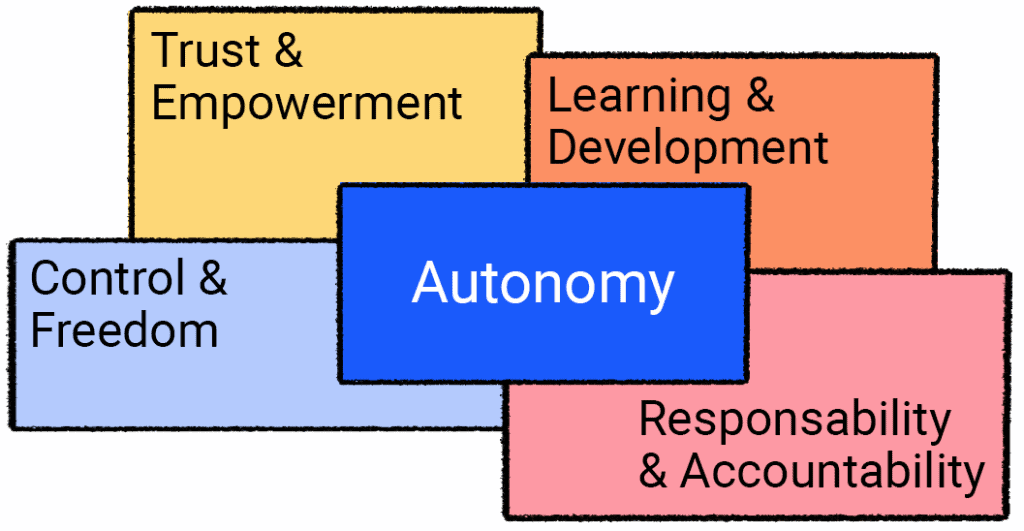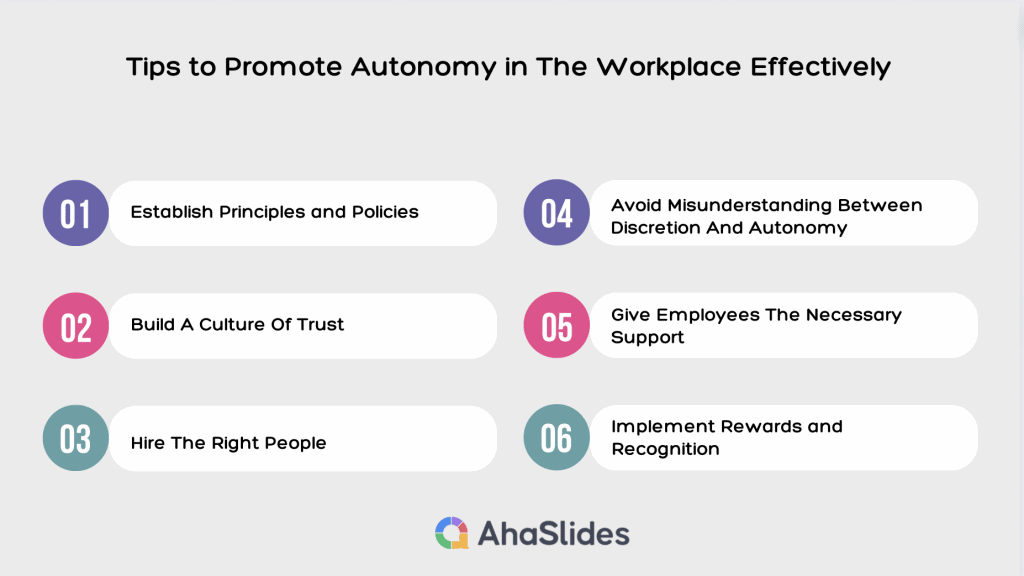When applied to the modern working environment, autonomy and discretion in the workplace are causing substantial changes not only in job quality but also in employee abilities and mindsets.
Promoting autonomy in the workplace is said to be key to building a creative and high-quality working environment, attracting and retaining talents, and fostering innovation. Is this true?
This post delves into the latest trend—autonomy at work—what it is, why it is important, how it is different from discretion, and how to properly apply it and prevent hazards.

Table of contents:
- What is Autonomy in The Workplace?
- Discover the Importance of Autonomy in the Workplace
- Tips to Foster Autonomy in The Workplace Effectively
- FAQs

Get your Employees Engaged
Start meaningful discussion, get useful feedback and educate your employees. Sign up to take free AhaSlides template
🚀 Grab Free Quiz☁️
What is Autonomy in The Workplace?
Autonomy in the workplace refers to the ability of an individual or entity to act independently, without external control or influence. It is the ability to act and choose according to one's own free will and action. Autonomy is frequently linked to individual freedom and self-governance.
When people have little independence and decision-making authority in their jobs, it's referred to as a lack of autonomy in the workplace. They might be subject to tight rules, inflexible procedures, and ongoing supervision from superiors.
One of the popular examples of autonomy at work is to lessen the workload and the dependence on the top management level in the headquarters, a large job has numerous departments and forbids specializations. The company should allow each department to be able to handle its budget or strategy. This implies that department heads can request and manage budgets without requiring approval from the executive board. It also implies that they have unrestricted creativity and financial autonomy within their department.

What are The Differences Between Discretion and Autonomy in The Workplace?
Although both represent freedom in choice and judgment of action on any given issue, there is still a distinct difference between autonomy and discretion at work. The fact that employees have a certain autonomy at work does not mean that there are no limits. They can decide how they want to do their job as long as it’s in line with both the overarching organizational and team goals. Discretion is based on one’s understanding of a situation while taking into account relevant factors and constraints, somehow still leveraging some degree of guidance or direction from others.
Discover the Importance of Autonomy in the Workplace
Imagine being told how to do every task, when to do it, and even how to think about it. You have little to no room for personal judgment, creativity, or independent decision-making. This, in essence, is the feeling of lacking autonomy in the workplace. It is the main reason for hindering innovations and growth. In particular, employees who feel controlled and unable to contribute meaningfully can be demotivated, feel incapable, and micromanaged can erode their self-worth, and so on.
However, misunderstandings and overuse of autonomy at work are also important issues. Many employees take them as excuses to shirk responsibilities, neglect team collaboration, or miss the deadline. When employers fail to share clear expectations and guidelines, individual approaches can vary greatly, leading to inconsistencies in quality and output. They might also make mistakes that go unnoticed, leading to rework and delays.
Thus, it is crucial for employers to build and maintain a culture of autonomy at work. So, how to do that? the next part reveals some useful tips for fostering autonomy in the workplace.
Tips to Promote Autonomy in The Workplace Effectively
How do you demonstrate autonomy at work? Here are some top suggestions for leaders to build a culture of autonomy effectively.

1. Establish Principles and Policies
You can create a framework that defends decision-making authority, autonomy, and the policies that go with it based on how your company regulates autonomy.
By creating distinct policies for each area of your company, you can free up workers to solve issues, make decisions, and oversee their work without intervention.
Next, make sure employees understand the boundaries and expectations of autonomy.
If it is not possible to devise a general policy, additional principles may be proposed. This sets out guidance on best practices without prejudice to any employee's policies which may be considered restrictive or completely unsuitable for autonomy at work. If communicated correctly, principles can be as effective as policies, while also providing opportunities to explore new ways of working.
2. Build A Culture Of Trust
A company should be a place where managers and staff trust one another, respect deadlines, and successfully finish projects with the highest cost-effectiveness. Additionally, processes should be transparent. Establish a culture where employees are guided by values rather than by rules.
Because of this, it requires time and must be constructed from the ground up. An employee steps into your company on the first day. You ought to support an organizational culture that values accountability, trust, and respect, where workers are encouraged and guided rather than coerced or threatened into achieving goals.
3. Hire The Right People
Not everyone is an appropriate match for your business, and not everyone will be a good fit for your business.
Ensure that the hiring process is thorough enough to result in workers who are not only excellent at their jobs but also fit in with the culture you are attempting to establish. Seek for individuals who possess experience and ease in a self-sufficient setting; people in whom you can place your confidence and who you know will deliver positive results. You can only create the workforce you want in this manner.
4. Avoid Misunderstanding Between Discretion And Autonomy
The capacity to make decisions on one's own, without outside direction or control, is referred to as autonomy. Conversely, discretion is the ability to make decisions within predetermined bounds or guidelines. These two ideas are not the same, even though they have some similarities. Confusion and misunderstandings may result from using these terms interchangeably.
5. Give Employees The Necessary Support
Motivate your staff to develop. Intelligence, experience, and skills are things that can be developed; however, just because someone has a job doesn't mean they should stop trying to get better at it. Employees will benefit from increased experience as well as improved situational judgment and decision-making skills.
When allowed to adopt a growth mindset, an employee will make an effort to become more professional and accountable for their work on all assignments. This is crucial for a variety of reasons, chief among them the development of a career path and employee loyalty.
6. Implement Rewards and Recognition
To support and foster a culture of appreciation and recognition that will encourage employee discretion and autonomy in the workplace, consider implementing rewards and recognition that will allow you to engage your team with a variety of individual rewards. Encourage employees to put in their best effort every day at work by demonstrating to them that their contributions are valued by supervisors and coworkers. Employee engagement and retention will increase as a result.
FAQs
What is the importance of autonomy?
The benefits of autonomy in the workplace allow individuals:
- Express themselves in their unique way.
- Independence can result in more imaginative and captivating language use.
- Discretion and autonomy should coexist to guarantee proper language use.
What are the problems with autonomy in the workplace?
Decision-making activities take up a lot of resources when job autonomy is increased, leaving fewer resources available for processing work tasks. Subjective well-being will decrease at this time due to decreased work efficiency and increased work pressure on individuals.
Additionally, weaker employees will feel unclear when working independently without clear objectives and goals. It is reasonable to add some specific principles to support employees' creative freedom without letting general company policies dictate their actions.
What is too much autonomy?
Employees who are given too much autonomy in the workplace must plan their workload. This serves as both a functional resource and a source of consumption. Because, in today's workplace, employees are not only allowed to make their own decisions; they are also required to do so.
Ref: thecontentauthority








